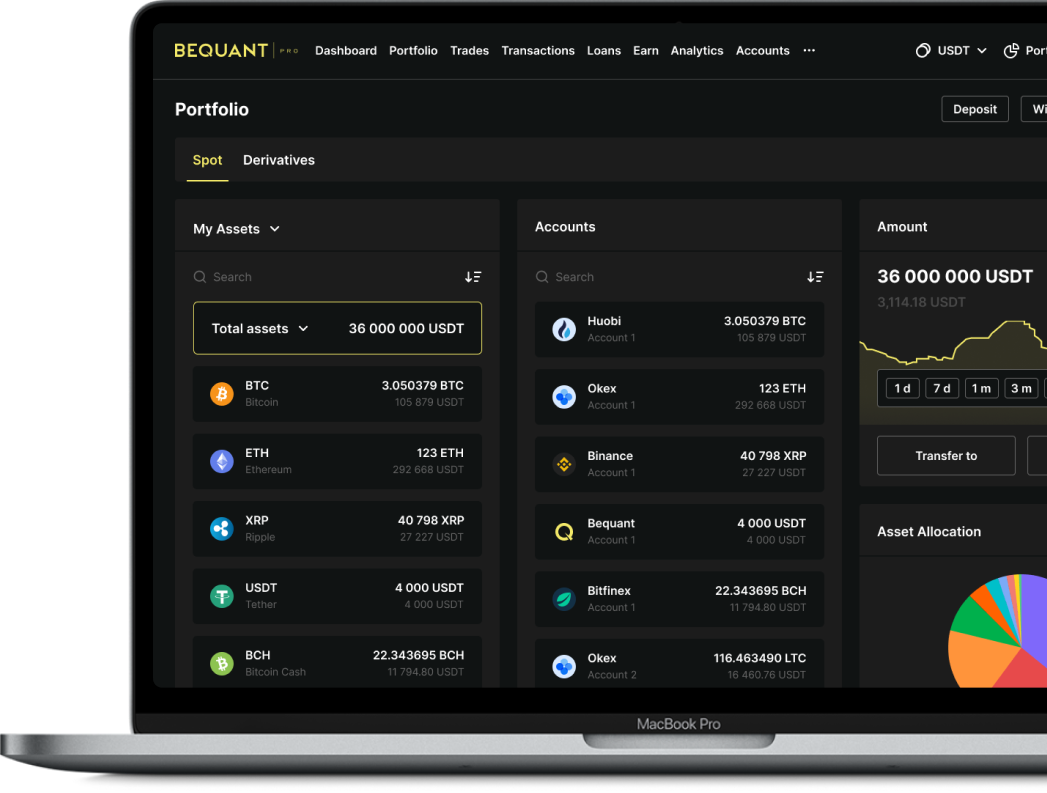A Sweet Summer Lull

Summary:
With volumes in US equity markets below their annual average and on-chain activity on the light side, as reflected in the lowest ETH fees in two years, we are in the last stretch of a sweet summer lull. Things could get tougher as the weather turns, as the flash PMI in the US and all-time low consumer confidence in Germany foretell. The expected dip in ETH post-merge next month could be exacerbated by a stronger dollar, given rate differentials with a more dovish ECB, which negatively correlates to digital assets.
Macro
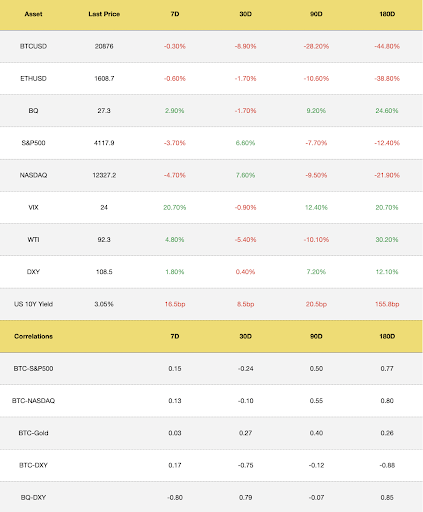
BEAR MARKET OR THE START OF A NEW BULL?
By Monday, the S&P had retraced 53% of its drop, which is as far as bear market rallies go, as pointed out by Jurrien Timmer of Fidelity, so if it breaches this level, it could be the start of another upturn, though we view that as unlikely. The S&P and NASDAQ, which for the past month rallied by about 10% each, peaked at the 200-day Simple Moving Average, implying an exhausted bear rally.
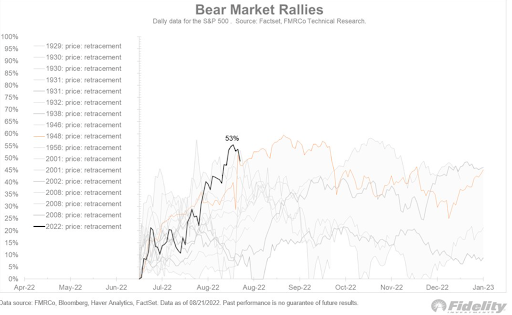
As usual, all eyes were on Fed chairman Jerome Powell, who spoke at the Jackson Hole Symposium on Friday. He referred to former inflation-busting Fed chair, Paul Volcker, and showed no signs of pivoting to cuts anytime soon. The market reacted accordingly.
Although there are signs that the economy is slowing down through the housing sector, the labor market continues to be “unsustainably hot” to quote Powell.
POPPING THE HOUSING BUBBLE
Back in April, the Fed warned of a brewing housing bubble. Monetary tightening led 30-year mortgage rates to shoot up from 3% to 5.6%, pricing many out.
The number of new home sales, a lagging indicator of real estate demand which can help predict recessions or recoveries, has been steadily falling since the start of the hiking cycle. Sales fell faster than forecasts as economists play catch up with the new reality.
Popping the bubble: New home sales in the U.S. have decelerated as mortgage rates have risen, as the Fed intended
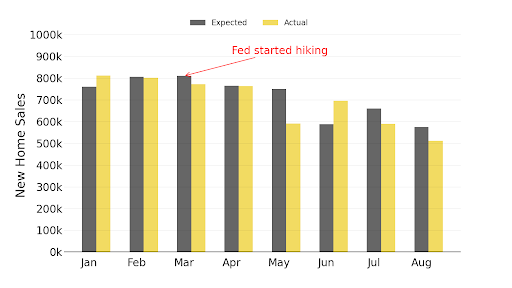
On the other hand, the leading indicator for the future rate of unemployment, initial jobless claims, declined over the past weeks. Surprisingly, this is after two 75bps hikes which are the largest in almost 30 years.
THE EURO, A CLUB NO ONE WANTS TO JOIN
France unexpectedly joined Germany with Composite PMI falling into contraction (49.8 and 47.6 respectively). Both showed a contraction in the manufacturing output and falling business expectations, citing uncertainty over the energy crisis and high inflation.
The EU Consumer Confidence also fell deeply into negative territory of -24.9 in August as skyrocketing spot prices of energy weigh on the pockets of the consumers. Russia's grip on supplies of natural gas put the EU into a prolonged period of a massive energy shock as shown by German Power Prices 1Y Forward.
Europe will have to pay up for its energy supplies this winter
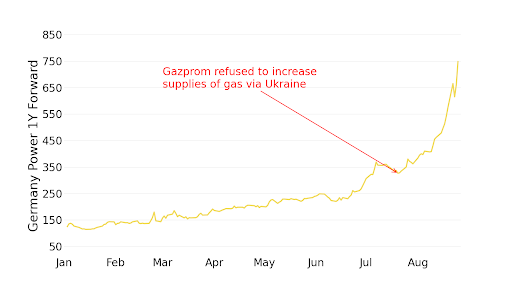
Although Germany's leading indicators are pointing to a "stagflationary" scenario, recent GDP figures give some hope that the EU might be just resilient enough to withstand the energy shock.
Can the German economy withstand an energy supply shock?
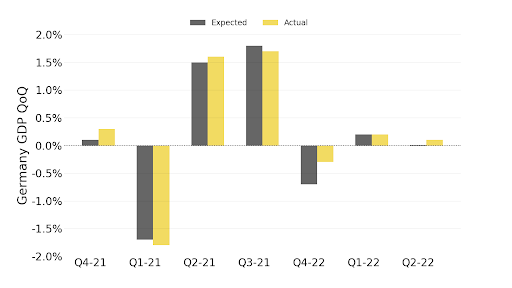
The ECB is in a difficult position. Should it raise rates to prevent a wage-price spiral or should it slow down in its hiking cycle due to falling consumer and business confidence?
The latest minutes from ECB indicated that members don't see inflation expectations de-anchoring and wages are still lagging behind inflation. In comparison, the Fed has been more hawkish, widening the gap between US and German 10Y yields and maintaining pressure on the euro.
CHINA STIMULATES BUT NOT NEARLY ENOUGH
Swimming against the tide, China announced yet another easing package for $1 trillion yuan ($146 bn) earmarked for infrastructure spending, in addition to $300 bn yuan announced in June.
The authorities have signaled that they won’t flood the market with liquidity and economists are projecting GDP growth below 4% for this year, well below the original 5.5% target. However, given that the liquidity injections have been selective, it is likely that they will need to take more aggressive action to meet their goal.
China's growth expectations slipped below government targets due to the COVID lockdowns
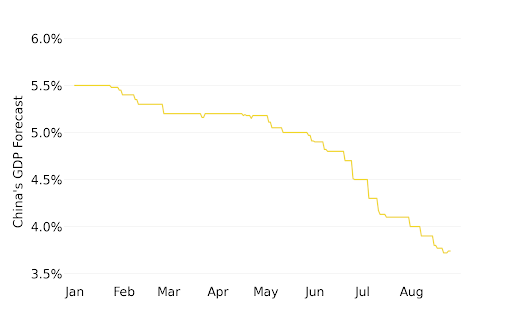
Total monetary and fiscal stimulus for the year stands at just over $5 trillion yuan. Back in 2008, China spent over twice as much, 4 trillion yuan, or 13% of GDP (the economy was less than half what it is today) on the largest stimulus package in relative terms for infrastructure and social welfare to combat the economic downturn, plus copious amounts of state bank lending. The total stimulus grew to an estimated 27% of GDP. As a result, China was the first country to come out of the recession and the stimulus led to a commodity boom.
There was a heavy price to pay though as investment in fixed assets jumped to 66% of GDP in 2009, and infrastructure investment to more than 18% of GDP, with easy credit fueling a property bubble and channeling capital to unproductive activities. Today, the Chinese real estate sector is the largest in the world and in a deep slump, with the government reluctant to increase leverage.
Regulation
SEC THINKS CRYPTO LENDERS ARE PLAYING CAT AND MOUSE
This week, in an OpEd piece in the WSJ, SEC chairman Gary Gensler again rammed home the message that crypto lending is subject to regulation. He cited the freezing of assets and bankruptcy of some lending platforms, as well as the recent $100 mn BlockFi settlement for non-disclosure to customers.
It’s no surprise given the unfortunate events leading to investors standing in line to recover their assets, that the agency has turned up the heat. Coinbase and FTX are in their crosshairs, with the former undergoing an investigation into whether they list securities. Coinbase denies the charges, saying that the SEC itself has reviewed the process by which they define listings.
|
“We can dispense with the idea that crypto lending isn’t subject to regulation. On the contrary, the rules have been around for decades. The platforms aren’t following them. Noncompliance isn’t the inevitable result of the crypto business model or underlying crypto technology. Rather, it is as if these platforms are saying they have a choice—or even worse, saying “Catch us if you can.” Gary Gensler, SEC chairman |
TETHER CHOOSES NOT TO BLOCK TORNADO CASH WALLETS
Earlier in August, after the US Treasury’s financial watchdog, the Office of Foreign Asset Control (OFAC), sanctioned coin mixer Tornado Cash accusing it of laundering billions of dollars, Circle, the issuer of USDC stablecoin, and the second leading stable, immediately blocked the sanctioned wallets.
This action caused backlash and confusion on effective implementation of the sanctions. It also prompted questions around how decentralized DeFi really is considering its reliance on centralized stablecoins.
In a sign of how uncertain regulation is, the leading stablecoin issuer, Tether Holdings, with a $68 bn market cap, said it hasn’t followed suit because it has not been asked to do so by the authorities and so would consider it “reckless”.
USDC has been gaining a share due to its focus on regulation and transparency when it comes to reserves, particularly after the May Luna crash, although USDC trades only a fraction of Tether’s volumes.
To address this competition, Tether recently reported an attestation, via a new auditor. BDO Italia, that its holdings of commercial paper were slashed by almost 60% to $8.5bn at the end of Q2. It will now release reports every month instead of every quarter, though USDC does it more often.
Separately, Rep. Tom Emmer, a Republican from Minnesota and crypto supporter, wrote to Treasury Secretary Janet Yellen asking how she plans to enforce these sanctions, which will be on computer code. Some high-profile individuals were sent tainted coins and as a result, were frozen out of protocols that were blocking wallets associated with the coinmixer.
REVOLVING DOOR
Former SEC chairman, Jay Clayton, has joined crypto VC, Electric Capital as an advisor, as well as Kevin Walsh, a former member of the Fed board of governors. He joins a long line of former government officials making their way into crypto over the last two years.
The revolving door remains open despite the bear market and strengthens ties with traditional institutions for the long term, eventually eliminating the confusion we are seeing today.
|
Mick Mulvaney |
Donald Trump’s chief of staff, Former Congressman. |
Astra Protocol |
|
Scott Bauguess |
Former SEC Deputy Director |
VP of Global Regulatory Policy, Coinbase |
|
Michele Korver |
Chief Digital Currency Advisor at the Financial Crimes Enforcement Network (FinCEN) |
Head of Regulatory, a16z |
|
Jay Clayton |
Former SEC head |
Advisor , Fireblocks and Electric Capital |
|
Brian Brooks |
Former acting head of the Office of the Comptroller of the Currency, |
Binance and then Bitfury |
|
Christian Sabella |
Former deputy director at the SEC |
Coinbase |
|
Max Baucus |
Former U.S. Senator from Montana |
Binance |
|
Katie Cox
|
Formerly the manager of the mergers and acquisitions section of the Board of Governors of the Federal Reserve System |
Avanti |
|
Thaya Brook Knight |
SEC lawyer |
Coinbase’s senior public policy manager |
|
Greg Monahan |
Former U.S. Treasury criminal investigator |
Binance |
|
Brett Redfearn |
SEC’s Director of the Division of Trading and Markets |
Coinbase and then Securitize |
|
Manuel Alvarez |
Former commissioner at the California Department of Financial Protection and Innovation |
Binance |
|
Mary Jo White |
Former SEC chair |
Ripple defense |
|
Chris Giancarlo |
Chairman of the Commodity Futures Trading Commission |
Advisor to CoinFund, board of Digital Assets |
Crypto
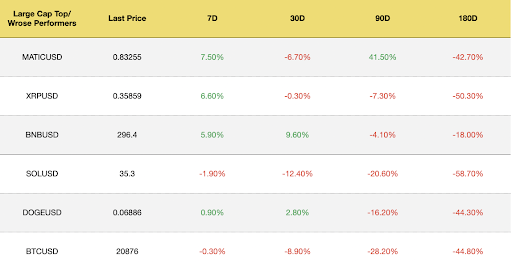
BREAKING EVEN
In terms of bitcoin, after falling $20k, Shrimps (<1 BTC) and Whales (>10k BTC) added to their positions but then distributed once above the realized price. Shrimp accumulation, which has been persistent in a weak market, also softened. From an institutional penetration perspective, 63% of on-chain transactions are now +$10 mn in size, up from 10% just two years ago.
Within Defi, APY has been on a steady decline as demand for borrow waned but picked up during the recent rally.
Price Sold/Price Paid: Investors are cashing out when they hit breakeven
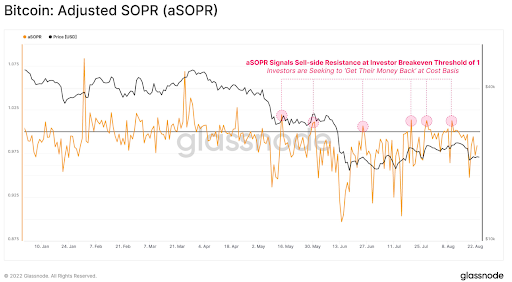
Long-term holders are feeling the pinch, but history shows we are almost at max pain
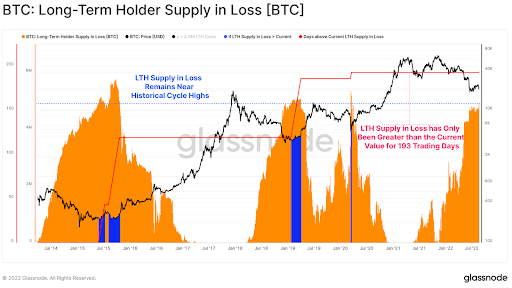
DeFi rates across liquidity pools hit lows in June as volatility spiked but have recovered slightly as trading activity picked up
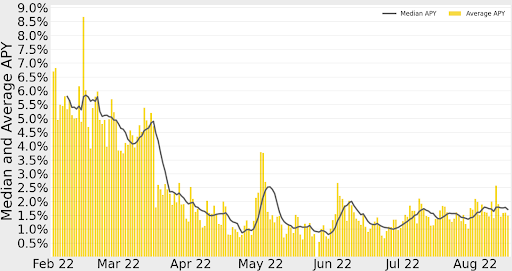
Source: DeFi Llama
COINBASE BETS ON STAKING ETH AS IT SEEKS DIVERSIFICATION
Coinbase Wrapped Staked ETH (cbETH) is a utility token that represents ETH2, which is ETH staked through Coinbase. cbETH can be sold or sent off-platform, while ETH2 will remain locked up until a future protocol upgrade. cbETH represents staked ETH plus all of its accrued staking interest. The aim is for cbETH to be adopted for trade, transfer, and use in DeFi applications.
MORE EFFICIENT NFT TRADING
Since the boom of NFTS last summer, the ecosystem has been in search of ways to better trade these digital assets. First, it was the rise of LookRare, with their incentive schemes to drain liquidity away from the dominant platform, OpenSea, but that created wash trading issues.
This was followed by aggregators, which allow traders to buy and sell collections more cheaply and efficiently, making purchases in batches and sweeping across marketplaces. Genie was acquired by leading DEX, Uniswap, in June while GEM was bought by OpenSea.
Peak NFT volume of $5.6bn last January has dwindled to $675 mn in July and Bored Apes are nearing mass liquidation value on BendDao. This has made it even more imperative to eliminate inefficiencies.
Uniswap is in talks with seven leading NFT lenders to improve liquidity fragmentation and asymmetry of information. Uniswap will imminently allow traders to buy and sell NFTs across multiple platforms. We also saw them integrate Sudoswap, “the Uniswap of NFTs.”
Sudoswap emerged last July as a decentralized gas-efficient marketplace that allows users to swap NFT for ETH using an automated market maker model, without first having to find a buyer. Liquidity providers (LPs) provide the liquidity pool for the pair to be tradable. Sudoswap is also royalty-free, which could be contentious to some.
Sellers can either sell or list their NFTs on sudoswap at their desired range. Volumes are still small but growing, with more competitive fees than on traditional platforms at 0.5% versus 7.5% plus, largely because of the lack of artist royalties.
NFT DEX sudoswap has proved popular with users
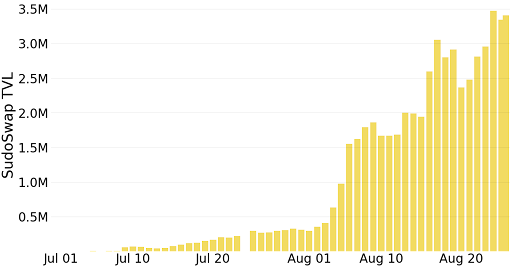
Source: DeFi Llama
sudoswap transaction volume and total revenue
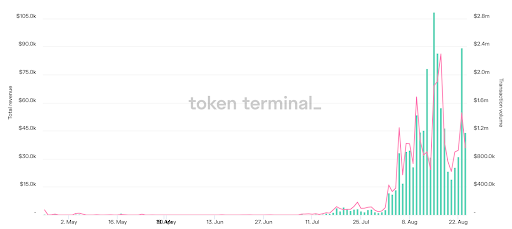
Until next week!
This document contains information that is confidential and proprietary to Bequant Holding Limited and its affiliates and subsidiaries (the “BEQUANT Group”) and is provided in confidence to the named recipients. The information provided does not constitute investment advice, financial advice, trading advice nor any other sort of advice. None of the information on this document constitutes or should be relied on as, a suggestion, offer, or other solicitation to engage in, or refrain from engaging in, any purchase, sale, or any other any investment-related activity with respect to any transaction. Cryptocurrency investments are volatile and high-risk in nature. Trading cryptocurrencies carries a high level of risk, and may not be suitable for all investors. No part of it may be used, circulated, quoted, or reproduced for distribution beyond the intended recipients and the agencies they represent. If you are not the intended recipient of this document, you are hereby notified that the use, circulation, quoting, or reproducing of this document is strictly prohibited and may be unlawful. This document is being made available for information purposes and shall not form the basis of any contract with the BEQUANT Group. Any transaction is subject to a contract and a contract will not exist until formal documentation has been signed and considered passed. Whilst the BEQUANT Group has taken all reasonable care to ensure that all statements of fact or opinions contained herein are true and accurate in all material respects, the BEQUANT Group
